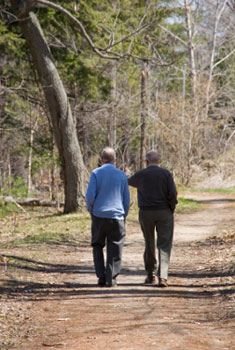Walk the Walk
A first-of-its-kind study investigates the connections between physical activity and health in older adults
By Jacqueline Mitchell

One of the groups being studied will participate in physical activities such as walking, strength training, balance and flexibility exercises five days a week. Photo: iStock
Can exercise stave off the aging process? That’s the question Tufts researchers hope to answer in a new six-year study on how physical activity affects the health of older people.
Led by principal investigator Roger Fielding, scientists at the Jean Mayer USDA Human Nutrition Research Center on Aging (HNRCA) at Tufts will share a two-year, $29.5 million federal grant with colleagues at eight other research institutions to initiate the Lifestyle Interventions and Independence for Elders (LIFE) study. The clinical trial will ultimately follow 1,600 senior citizens over six years to determine whether a structured exercise program can prevent major mobility disability—defined as the inability to walk a quarter mile—in elders.
“To an older adult, a quarter-mile walk is a shopping trip or a short walk around the neighborhood,” says Fielding, who is director of the Nutrition, Exercise Physiology and Sarcopenia Laboratory at the HNRCA and a professor at the Friedman School.
At Tufts, Fielding and his colleagues, including Miriam Nelson, an associate professor at the Friedman School, will recruit 200 men and women ages 70 to 89. The volunteers will be randomly assigned to one of two groups. One group will participate in physical activities such as walking, strength training, balance and flexibility exercises five days a week at the HNRCA. The other will attend regular educational seminars about healthy aging.
Members of both groups will have some degree of physical limitation. The volunteers who score poorly on a short test that measures gait speed, agility and balance will be enrolled in the study. But, says Fielding, the enrollees must be able to complete a 400-meter-walk—about a quarter of a mile.
“We are tracking when they lose the ability to do the 400-meter walk,” says Fielding. “Our hypothesis is that the educational intervention group will lose it sooner than the physical intervention group.”
The six-year study, which will be the longest-running research on exercise and older adults ever conducted, will allow scientists to study the effects of physical activity on other aspects of health and well-being in seniors, including cognitive function. For example, the research will attempt to determine if routine exercise can prevent depression and stave off dementia.
“This trial will be following folks for so long, we’ll be able to look very carefully at this group, which is at risk for cognitive decline,” says Fielding. “That’s the major secondary outcome of the entire trial.”
Over the course of the six-year project, the National Institute on Aging, part of the National Institutes of Health, is expected to contribute a total of $64 million in funding, including the initial $29.5 million from the American Recovery and Reinvestment Act of 2009.
Fielding already has been collaborating with the other LIFE trial researchers, whom he calls “the dream team of investigators in geriatrics,” for eight years. The LIFE study is based on a successful pilot study the same group published in 2006 that followed more than 400 elders for one year. That study found that elders in the routine exercise group improved their walking speed and had a lower incidence of major mobility disability than the group that received health education intervention.
“We’re a well-oiled machine,” Fielding says of his longtime collaborators. “The best part is we get to continue to interact for at least another six years.” The other LIFE trial field sites are the University of Florida, which is the coordinating center; Northwestern University; Pennington Biomedical Research Center, a campus of the Louisiana State University system; Stanford University; the University of Pittsburgh; Wake Forest University Health Sciences and Yale University.
“The challenge and the real education for us will be to learn how well we can maintain older adults [sticking to an exercise program] for this length of time,” says Fielding. “We can learn a lot.”
Jacqueline Mitchell can be reached at jacqueline.mitchell@tufts.edu.

